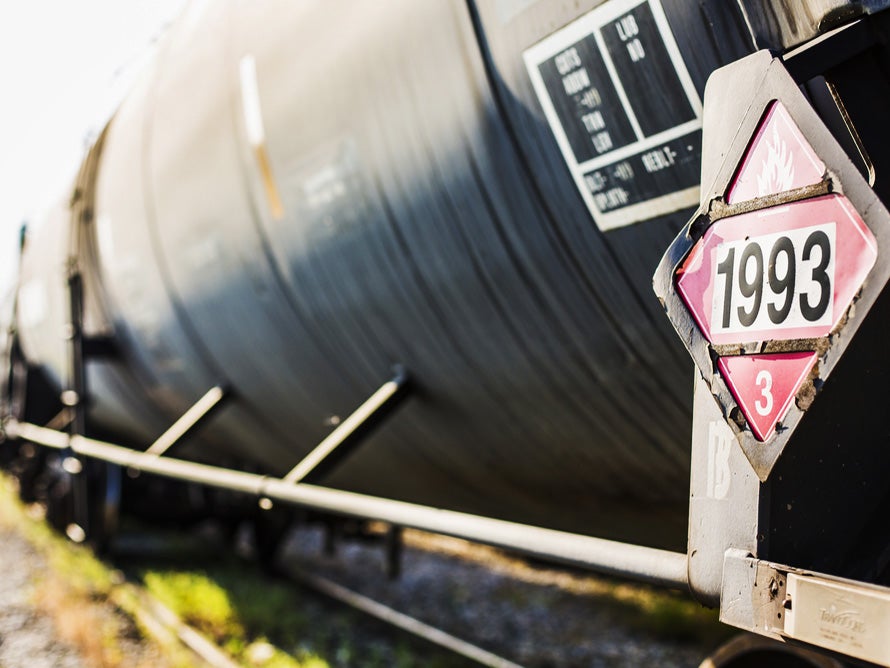Communities Turn the Tide in the Fight to Stop Explosive Oil Trains
A little-known federal agency recently reassured communities that they can say no to oil shipping terminals.

This page was published 9 years ago. Find the latest on Earthjustice’s work.
Fighting back against the wealthy and powerful oil industry is no small task. But this September, local communities got a boost in the battle to stop explosive oil trains after a little-known federal agency reassured residents that they can say no to local oil shipping terminals.
For years, oil companies on the West Coast have proposed to build offloading facilities on communities’ doorsteps. And in some places, they’ve insisted that local communities can’t require additional safety measures or deny their permits, based on arguments about interstate commerce and federal railroad law. These arguments often left local decision-makers confused about their role and power. But the federal Surface Transportation Board, which primarily handles conflicts among railroads, recently cleared things up for everyone by confirming that local officials have the legal authority to review, accept or reject the construction of crude-by-rail facilities in their towns.
Just weeks after this landmark decision, the Shell Puget Sound Refinery in Anacortes, Washington, announced that it was abandoning plans to construct a crude-by-rail facility in Skagit County. Originally proposed in 2014, the project faced overwhelming community opposition. Shell was forced to undertake an environmental and public health review following a legal challenge. The transportation board’s decision confirmed that local opposition to its project could lead to denial, a fact that Shell surely considered when it abandoned construction plans.
“This is an extraordinary victory for the people of Skagit County and Washington state,” said Kristen Boyles, an Earthjustice attorney who represented conservation groups in a legal challenge against Shell in Anacortes. “Having a full and transparent public process exposed everyone—including, apparently, Shell itself—to the risks and harms of this project.”
“Having a full and transparent public process exposed everyone—including, apparently, Shell itself—to the risks and harms of this project.”
The ripple effects of the transportation board’s ruling didn’t stop there, however. Within weeks of the board’s decision, the community of Benicia, California, also used this opportunity to flex their rights by rejecting a proposal from oil giant Valero to build a new facility in their waterfront town.
“The community of Benicia, in the crosshairs of history, made one of those decisions that will make a difference for the country. They stood up and said, ‘The safety of our communities matters,’” Yolo County Supervisor Don Saylor told the Sacramento Bee.
Another California community soon followed in Benicia’s footsteps. On October 5, the San Luis Obispo County Planning Commission voted to reject Phillips 66’s proposed oil train facility in Nipomo, California. The decision came after almost three years of review. More than 20,000 Californians opposed the project, and more than 45 cities, counties and school boards sent letters urging the planning commission to reject the Phillips oil facility. Community members came together to safeguard their homes, and the transportation board ruling helped give them the confidence to stop Phillips from bringing pollution and health problems to their neighborhoods.
Sadly, the fight against crude-by-rail is far from over. In the boom-and-bust world of oil production, the transportation of crude by rail has skyrocketed in just the past three years (although numbers have now begun to fall). The dramatic increase in crude oil tank cars, combined with scarce protective regulations, has led to a rash of rail accidents and explosions. Oil train cars and transfer facilities also release toxic pollutants that threaten the health of nearby communities, and low-income neighborhoods and communities of color are often targeted as locations for crude oil shipment.
Earthjustice is helping communities in California, New York, Oregon and Washington state fight back against dangerous crude-carrying trains. Just last month, we helped residents of a public housing project in Albany, New York, push back against a major crude-by-rail terminal owned by Global Companies. Now, Global will be required to conduct extensive emissions tests and complete a comprehensive environmental review before continuing operations.
As communities pull together and find their voices, oil companies can no longer do whatever they want, wherever they want. The transportation board’s decision confirms that communities have the power to fight back—and win.
The California Regional Office fights for the rights of all to a healthy environment regardless of where in the state they live; we fight to protect the magnificent natural spaces and wildlife found in California; and we fight to transition California to a zero-emissions future where cars, trucks, buildings, and power plants run on clean energy, not fossil fuels.